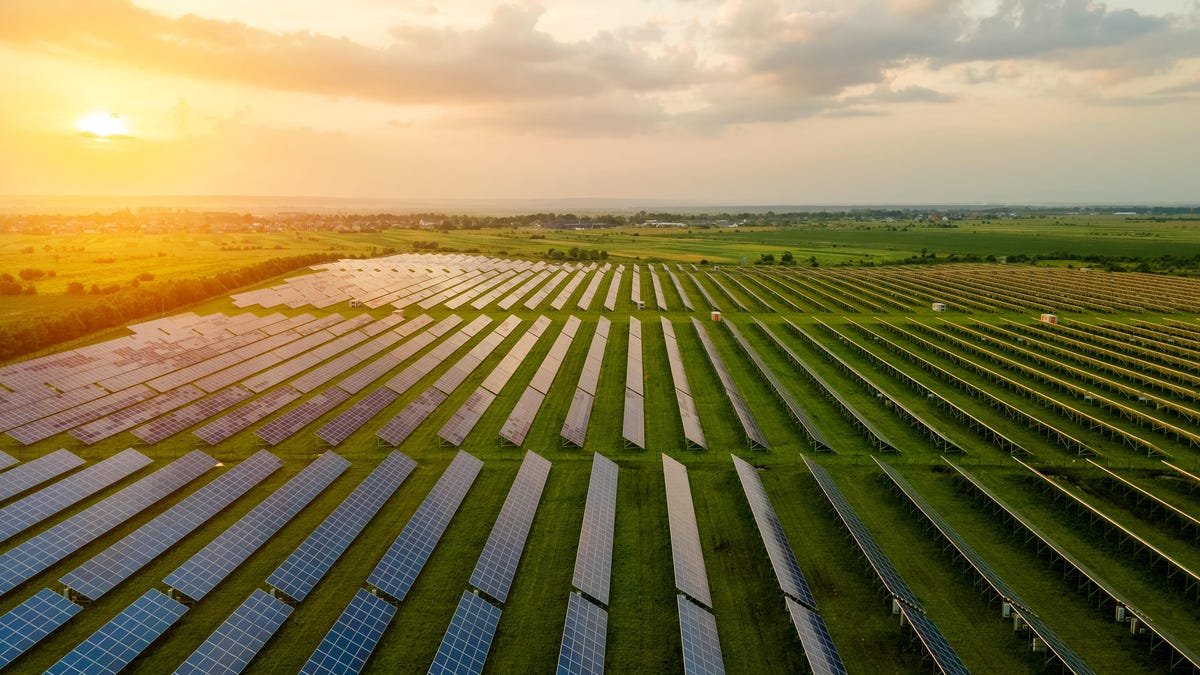Arcadia Power Review: Community Solar Made Simple
This company connects you with solar farms so you can buy clean electricity -- if community solar is available where you live.

Community solar connects you with a solar farm like this one.
One of the largest community solar companies in the US, Arcadia is hoping to help the many Americans who can't put solar panels directly on their homes to benefit from renewable energy.
Community solar is a rapidly growing sector that allows all kinds of people to buy into a nearby solar farm and save at the same time.
Becky Peyton, senior manager of partnerships for Arcadia, said it often sounds too good to be true to people learning about community solar for the first time.
"Folks are thinking 'so this is a good thing that I'm doing and I'm guaranteed a reward for it? How does that work?'" she said.
So far, it usually works through state legislation that often comes with infrastructure funding to help set up solar farms. Here's everything you need to know.
About Arcadia
Arcadia, based in Washington, DC, was started in 2014. Its stated goal is "to help make renewable energy accessible to every household in America," Peyton said.
Today Arcadia's primary offering for consumers is participation in its community solar program. This is a simple way for anyone with a utility bill to save a little money and support both renewable energy and a more resilient grid.
What is community solar?
Community solar programs and rules are typically established through state-level legislation, and vary from place to place and utility to utility. But the basic concept is offering a way to subscribe to an off-site solar energy system, typically a solar farm located within the participating utility's geographic footprint.
Participating utilities commit to buy solar energy from Arcadia, which sells subscriptions to consumers and buys energy from solar farms. In some states consumers pay Arcadia, which then pays the utility on their behalf and also the farm. Others will see a community solar credit directly on their utility bill.
The energy from the solar farms does intermix with electricity from other non-renewable sources when it flows into the grid. Peyton uses a river analogy to describe how the energy mix is being delivered.
"The more clean water that you're bringing into this river the cleaner the entire grid will be. So the wider that tributary can become and hopefully it will eventually take over the whole river," she said
The benefits of community solar for consumers amount to savings on utility bills, while actively supporting renewable energy. Those savings come from the low cost of generating solar energy as well as net metering benefits and state and federal incentives.
"By signing up for the program you are still guaranteed the same stability in your energy. But you get that guaranteed savings along with it," Peyton added.
Arcadia will soon be connecting Californians to solar farms like this one.
One drawback to community solar at the moment is that there isn't enough capacity to meet demand. Peyton said many community solar projects are on hold while details from the Inflation Reduction Act are still being ironed out, so it may take a while to be matched to a solar farm.
She added that some utilities require subscribers to participate in autopay, which isn't ideal for some people.
Does Arcadia company operate in my state? How do I sign up?
Arcadia operates in 13 states and Washington, DC. Service in California is coming soon.
Peyton said signing up starts with checking Arcadia's website to see if your local utility participates in the community solar program. If it does, from there you either enter your utility account number or the online credentials for your utility account to sign up with Arcadia. You may be prompted to enter payment information and accept the terms of service.
Peyton added that the whole process takes just a couple minutes to complete: "It's signing up for Spotify or Netflix-type easy."
You will be informed which farm you are matched with in your Arcadia account dashboard. In some states, low-income individuals may qualify for even better rates.
Arcadia pros and cons
The most tangible benefit for most Arcadia subscribers comes in the form of guaranteed savings on their utility costs without having to sacrifice a stable energy source or set up an expensive solar system on a residence. It's also a way to support more renewable energy.
There are few concrete downsides, but the concept can be difficult to understand and is only available in 13 states.
Pros
- Anyone with a utility bill can participate
- Monthly utility bill savings
- Support for a more diverse energy mix
Cons
- May take some time to be matched to a solar farm
- Some programs may require autopay
Arcadia FAQs
Is Arcadia Power a legitimate company?
Yes, Arcadia runs community solar programs in partnership with utilities in 13 states and Washington, D.C.
Is Arcadia Power free?
No, it works in conjunction with local utilities and may offer savings on monthly power bills.
Claims about free solar you might see bouncing around the internet are typically marketing solar setups that aren't really free. They may refer to legitimate options like solar leases or power purchase agreements that often require no money down, but they might be scammy companies making promises they can't keep.
What does Arcadia Power do?
Arcadia offers subscriptions to local solar farms in partnership with certain utilities.



